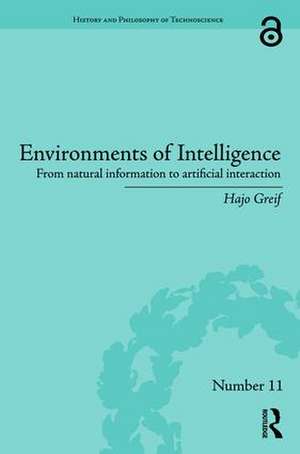Environments of Intelligence: From natural information to artificial interaction: History and Philosophy of Technoscience
Autor Hajo Greifen Limba Engleză Hardback – 23 aug 2017
With respect to human cognition, the most notable effect of digital computers is not that they might be able, or become able, to think but that they alter the way we perceive, think and act.
The Open Access version of this book, available at http://www.tandfebooks.com/doi/view/10.4324/9781315401867, has been made available under a Creative Commons CC-BY licence
Din seria History and Philosophy of Technoscience
-
 Preț: 310.65 lei
Preț: 310.65 lei -
 Preț: 311.18 lei
Preț: 311.18 lei -
 Preț: 386.18 lei
Preț: 386.18 lei -
 Preț: 469.34 lei
Preț: 469.34 lei -
 Preț: 486.38 lei
Preț: 486.38 lei -
 Preț: 469.34 lei
Preț: 469.34 lei - 17%
 Preț: 259.98 lei
Preț: 259.98 lei -
 Preț: 467.44 lei
Preț: 467.44 lei -
 Preț: 468.97 lei
Preț: 468.97 lei -
 Preț: 389.66 lei
Preț: 389.66 lei - 26%
 Preț: 821.53 lei
Preț: 821.53 lei - 31%
 Preț: 792.03 lei
Preț: 792.03 lei -
 Preț: 492.96 lei
Preț: 492.96 lei -
 Preț: 382.75 lei
Preț: 382.75 lei - 17%
 Preț: 259.72 lei
Preț: 259.72 lei -
 Preț: 383.71 lei
Preț: 383.71 lei - 17%
 Preț: 259.98 lei
Preț: 259.98 lei -
 Preț: 389.38 lei
Preț: 389.38 lei -
 Preț: 386.99 lei
Preț: 386.99 lei -
 Preț: 391.65 lei
Preț: 391.65 lei -
 Preț: 311.47 lei
Preț: 311.47 lei -
 Preț: 389.66 lei
Preț: 389.66 lei - 18%
 Preț: 1001.90 lei
Preț: 1001.90 lei - 18%
 Preț: 1057.09 lei
Preț: 1057.09 lei
Preț: 449.41 lei
Nou
Puncte Express: 674
Preț estimativ în valută:
85.100€ • 90.01$ • 71.57£
85.100€ • 90.01$ • 71.57£
Carte tipărită la comandă
Livrare economică 31 martie-14 aprilie
Preluare comenzi: 021 569.72.76
Specificații
ISBN-13: 9781138222328
ISBN-10: 1138222321
Pagini: 230
Dimensiuni: 156 x 234 x 19 mm
Greutate: 0.45 kg
Ediția:1
Editura: Taylor & Francis
Colecția Routledge
Seria History and Philosophy of Technoscience
Locul publicării:Oxford, United Kingdom
ISBN-10: 1138222321
Pagini: 230
Dimensiuni: 156 x 234 x 19 mm
Greutate: 0.45 kg
Ediția:1
Editura: Taylor & Francis
Colecția Routledge
Seria History and Philosophy of Technoscience
Locul publicării:Oxford, United Kingdom
Public țintă
PostgraduateCuprins
- Preliminaries: Ants and Robots, Parlour Games and Steam Drills
Background
Outline
I Informational Environments - Resurrecting Dretskean Information
Information, Behaviour, and Probability
The Content of Natural Information, and Some Discontent
Alternative Information
Natural Information and the Roots of Intentionality - Varieties of Perception
Perception as Information Processing: The Computational View
Information Specifies Affordances: The Ecological View
Perceptual Illusions vs. Misperception: The Empirical Strategy - The Domains of Natural Information
Natural Information and Reference Classes
Informational Domains
Resurrection at Last - Making an Environment
History, Ecology, Environment
Adapting Ecological Niches
Construction and Constitution - What is an Informational Environment?
Environmental Information and the Use of Cognition
What Informational Environments Are
How Informational Environments Change
II Environments of Intelligence - The Extension of the Extended Mind
The Extension of Functional Histories
The Constitution of Cognitive Extensions
Constitutional Matters
The Art of Coupling, Basic and Advanced - The Nature of Cognitive Artefacts
Being Guided by Pictures
Cognitive Artefacts and Informational Environments
Convergence and Isomorphism - The Intelligence of Environments
Embodied Conversational Agents and Social Robotics
Second Life
Mixed Reality Games
Augmented Reality
Naturalising the Artificial
10 Afterthoughts on Conceptual Analysis and Human Nature
A Domain for Conceptual Analysis
A Naturalist’s View of Human Nature and Machines
BibliographyIndex
Notă biografică
Hajo Greif is Research Assistant Professor at the Department of Philosophy and Ethics in Administration, Warsaw University of Technology. He also works as Senior Researcher at the Munich Center for Technology in Society (MCTS), Technical University of Munich. His research interests cover the philosophy – and some of the history an the social studies – of science and technology, as well as the philosophy of mind.
Recenzii
"An absorbing volume that integrates an extraordinarily wide area of work, with interesting observations and new twists right to the end."
Ruth Millikan, University of Connecticut, USA
Ruth Millikan, University of Connecticut, USA
Descriere
What is the role of the environment, and of the information it provides, in cognition? More specifically, may there be a role for certain artefacts to play in this context? These are questions that motivate '4E' theories of cognition (as being embodied, embedded, extended, enactive). In his take on that family of views, Hajo Greif first defends and refines a concept of information as primarily natural, environmentally embedded in character, which had been eclipsed by
information-processing views of cognition. He continues with an inquiry into the cognitive bearing of some artefacts that are sometimes referred to as 'intelligent environments'.
information-processing views of cognition. He continues with an inquiry into the cognitive bearing of some artefacts that are sometimes referred to as 'intelligent environments'.
